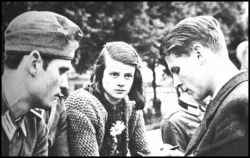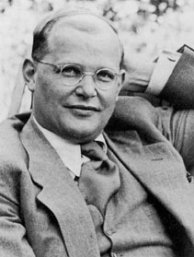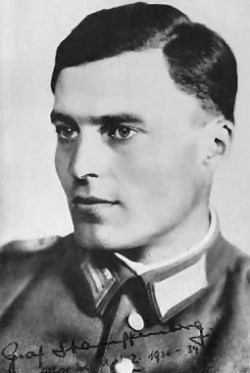German Citizens Resistance to the Holocaust
Alex Barker
History has provided resounding excuses for why Germany sat back and allowed Hitler to commit the atrocities that he did during his reign. There have been debates and discussions regarding free will, the herd mentality, and a person's right to protect their own life over another's. However, not all German citizens were indifferent to the Third Reich's practices and many risked the lives of themselves and their family to stand up for the rights of Germany and all of its citizens, including the Jewish people.
Hans and Sophie Scholl

As children, Hans and Sophie Scholl were both members of the Hitler Youth in Germany. However, having been raised in a family of free thinkers and independents it did not take long for both of them to realize that they were not in accordance with many of the principles of the Hitler youth, including anti-Semitism. They both left the Hitler Youth shortly after joining. As a family, the Scholls participated in passive resistance against the Third Reich. They read books by Thomas Mann, Werner Berggruen and Paul Claudel, even though these authors were banned from being read in Germany by the Nazis.
Hans and Sophie Scholl both headed to the University of Munich when they turned 18. They both kept extensive diaries of their time at the University, as they were exposed to many scholars, artists, and musicians who held their views despite the constraints of the Third Reich.
One Sunday, Hans and Sophie attended church together and heard a sermon given by Bishop Galen on the euthanasia of the mentally-ill and developmentally delayed. The Scholls were horrified by the information that they were hearing. Sophie received permission to reprint the Bishop’s sermon and turned it into a pamphlet. Sophie and Hans along with other students handed out these pamphlets on the campus of the University of Munich.
Through the University, Hans and Sophie met a very influential professor named Professor Huber. The three of them founded a non-violent resistance group comprised of entirely Germans called The White Rose. The White Rose planned events on campus to support the campus civil rights and opposition to Nazi practices. They held weekly discussion groups and distributed leaflets denouncing the Third Reich. One of their main goals was to encourage the students of Munich to think for themselves, so they painted “Freedom” on many of the bricks around campus.
The Jewish Persecution was at the center of The White Rose’s resistance. Since many people in Germany were denying the persecution of Jews, The White Rose published pamphlets describing the deportations and mass executions of the Jewish people.
The resistance of The White Rose came to an end on February 22, 1943 when the Gestapo found Hans and Sophie Scholl. They were accused of treason and sentenced to death by the Guillotine.
Diedrich Bonhoeffer

Dietrich Bonhoeffer was born in Germany in 1906. He attended Berlin University and received his doctorate in theological studies. In 1931, he was ordained a Lutheran pastor and served the Lutheran church faithfully. In 1934 Bonhoeffer was 1 of 2,000 Lutheran pastors who formed the Pastors’ Emergency League. This organization started as an opposition of the state church controlled by the Nazis. Later, this organization formed a Confessing Church that served as a free and independent protestant church.
Despite Bonhoeffer’s religious views that Chrisitians were superior to the Jewish, he did not believe in the state persecution of the Jews. He believed that the “Jewish Question” should be solved by the conversion of Jews to Christianity. However, when the deportations and mass executions became known to Bonhoeffer he started to see the “godless face” of the Nazi Empire and denounce the Nazi practices.
Bonhoeffer actively opposed National Socialism until 1940 when he was recruited into the underground resistance movement to topple Hitler. Several men who were members of the Abwehr, the German Military Intelligence, led this conspiracy. Bonhoeffer held two main responsibilities for the resistance movement. He was a courier and also a diplomat to the foreign governments. For years Bonhoeffer embezzled money to help Jewish immigrants, as well as to support the Confessing Church. He was arrested in 1943 when the Gestapo found a large sum of money that he was using to fund a Jewish rescue mission. However, the conspiracy to assassinate Hitler was not revealed to the Nazis until 1945 when all the members of the underground movement had been arrested. On April 9, 1945 Hans Bonhoeffer was arrested for his involvement in the Anti-Nazi resistance movement.
Claus von Stauffenberg

Claus Von Stauffenberg was born in Germany in 1907. As a young student, Claus attended the War Academy in Berlin and joined the General Staff of the German army in 1938. Stauffenberg served combat positions in all of Hitler’s major campaigns across Europe including Sudetenland, France, Poland, and Operation Barbarosa. It was during Barbarosa that Stauffenberg became disgusted at the actions of the Secret police, the treatment of prisoners of war, and the mass executions of the Jewish people.
From 1940-1944, Stauffenberg served in the Army High Command/General Staff Headquarters. In 1942 it became clear to Stauffenberg that he must try to overthrow Hitler. He spent the next year trying to convince senior officials of Hitler’s malnature. In 1943 he joined the civilian led conspiracy to assassinate Hitler called the July Plot.
The July Plot was a plan to assassinate Adolf Hitler, Herrman Goering, and Heinrich Himmler. After the planned assassination, Ludwig Beck, Erwin von Witzleben, and Friedrich Fromm would take control of the German army and seize government buildings, telephone and signal centers, and radio stations. Stauffenberg was set to become the State Secretary of the War Ministry in this new government.
On July 11, 1944, Stauffenberg brought a bomb in a briefcase to a briefing session in which he believed Adolf Hitler, Herrman Goering, and Heinrich Himmler would all be attending. Herman Goering and Heinrich Himmler were not present at the briefing so Stauffenberg was ordered by senior conspirators to abort the attempt. However, Stauffenberg and his close friend Colonel von Mertz agreed in secret to still attempt the assassination against Hitler. However, when Stauffenberg returned to the briefing it had already been dismissed and Hitler was gone.
On July 20, 1944 Stauffenberg carried another briefcase bomb into a briefing in which all three men were attending. When Stauffenberg stepped out to make a phone call, the bomb exploded. The bomb killed four men but not any of the aimed targets. The planned coup unraveled because Hitler survived the attack, co-conspirator General Friedrich Olbricht did not set the coup in action within the first two hours after the attempt, and the other conspirators failed to seize any government buildings.
In order to protect himself, Friedrich Fromm organized the assassination of Stauffenberg and three co-conspirators. On July 21, 1944, Claus von Stauffenberg was assassinated shouting “Long live free Germany!”
